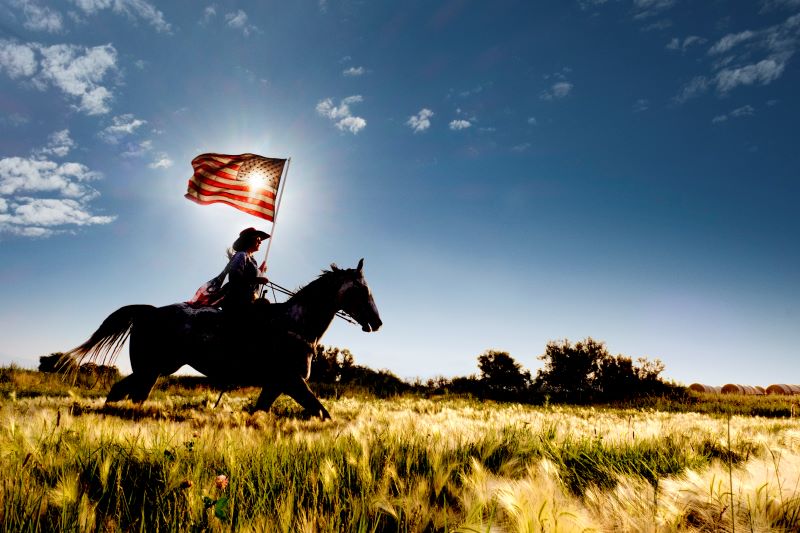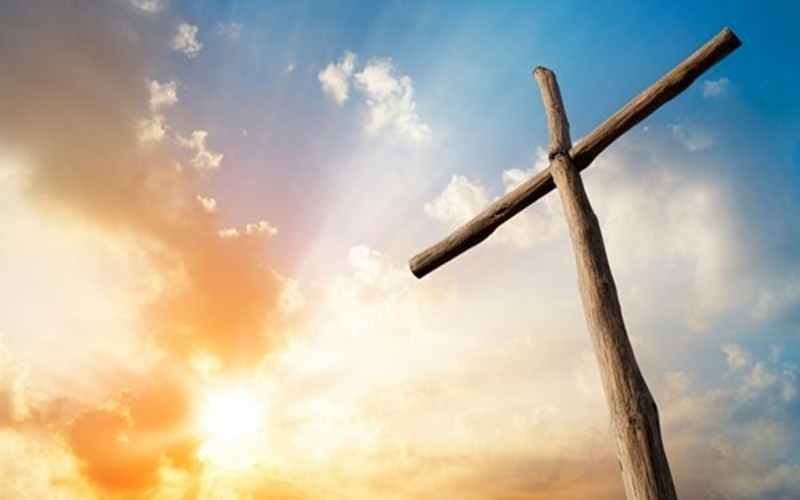The Day America Disappeared
Sign up for a six month free
trial of The Stand Magazine!
The day America disappeared
A Biblical commentary on the transience of nations
Most of us have probably figured that, if America were to end as a nation, it would be a gradual devolution like other world powers in history, with strength giving way to weakness, decay and death.
On the other hand, some may remember the paranoia of the Cold War, when there was fear that the U.S. might be obliterated in a surprise nuclear attack launched by the Soviet Union.
But a super volcano?
Hunting for some bit of information on another subject, this writer stumbled upon a 2005 article from the British Broadcasting Corporation (BBC) in which geologists issued a report calling for the establishment of a task force that would consider responses to the eruption of a super volcano. Like the one located in the U.S.
A “super volcano” in the U.S.? That’s right. Sitting right beneath Yellowstone National Park in Wyoming. Right beneath “Old Faithful.”
“We don’t want to be sensationalist about this, but it’s going to happen. We just can’t say exactly when,” geologist Stephen Self of Britain’s Open University told the BBC. Self was one of the scientists on the working group that prepared the report, issued by the Geological Society of London.
For most people the word “volcano” brings to mind the traditional image of a cone-shaped mountain and the expulsion of lava, rock and ash being funneled out the top following an explosive eruption.
But a super volcano is different. Self said, “Super eruptions are up to hundreds of times larger” than volcanoes like Mount St. Helens, which erupted in 1980, or Krakatoa, which blew its top in spectacular fashion in 1883.
The reason? A super volcano lies under what’s called a caldera – from the Spanish word for “cooking pot” or “cauldron” – because it takes the shape of a bowl-like depression in the earth. They are often many miles across. The caldera in Yellowstone, for example, is roughly 34 miles by 45 miles wide. Pressure from magma builds under the crust of the depression but cannot find any intermediate way of releasing pent-up pressure.
Stephen Sparks of the University of Bristol told MSNBC, “In super eruptions the magma chamber is huge,” and the eruption comes rapidly – in a matter of days. “When the magma erupts the overlying rocks collapse into the chamber, which has reduced its pressure due to the eruption. The collapse forms the huge crater.”
According to MSNBC, in 2001 U.S. geologists published a study in the journal Earth and Planetary Science Letters that outlined the catastrophic results of a Yellowstone super eruption. Half the United States would be covered in up to three feet of ash.
“The whole of a continent might be covered by ash, which might take many years – possibly decades – to erode away and for vegetation to recover,” Sparks said.
The U.S. would literally cease to exist.
Bil McGuire, one of the U.K.’s top volcano experts, told U.S. News & World Report that “the annual probability of an eruption is very small. … Having said this, it is likely that another eruption will happen at Yellowstone sometime. Not only do we not know when this will happen, but we are also not well-versed in differentiating the signs of unrest associated with the normal activity of the caldera from those that presage a forthcoming eruption.”
Just fiction?
Like we don’t already have enough to worry about. Of course, it’s rarely helpful for the average person to contemplate the consequences of asteroid impacts, plagues of flesh-eating bacteria or dinosaurs being unleashed by hapless, jury-rigging DNA scientists.
On the other hand, it is a peculiar trait among humankind that most of us live our lives under the assumption that we won’t die today or tomorrow or until some day far into the future. Super volcanoes or not.
This assumption of permanence is a blind spot addressed in Scripture. James warns those who plan their lives without a thought to the God who gives us breath: “Yet you do not know what your life will be like tomorrow. You are just a vapor that appears for a little while and then vanishes away. Instead, you ought to say. ‘If the Lord wills, we shall live and also do this or that’” (James 4:13-15).
Even at the end of the age, during times of tremendous upheaval and crisis, Jesus said that people would busy themselves with life’s affairs until the very moment when history ends (Matt. 24:38, 39).
Many people who manifest this blindness to the precarious nature of their individual lives exhibit the same trait when it comes to their collective lives. They inhabit homes and cities and nations, but assume that a collective intransience is likewise guaranteed.
Many might find the idea of a super volcano devastating the U.S. nothing more than movie fodder. After all, America couldn’t possibly be overthrown so utterly and dramatically, right? Our nation was ordained by God to be a beacon of hope and a shining example of liberty. Or as the great Puritan John Winthrop said in 1630, “a city upon a hill.”
The guilt of Sodom
That God of providence, however, is the same One that spoke these words to the prophet Jeremiah: “Or at another moment I might speak concerning a nation or concerning a kingdom to build up or to plant it; if it does evil in My sight by not obeying My voice, then I will think better of the good with which I had promised to bless it” (Jeremiah 18:9, 10).
These words come immediately after God tells Jeremiah that He is righteous and just to bring about “calamity” upon obstinate and wicked nations.
But that couldn’t happen to America. After all, the destruction of cities like Sodom and Gomorrah were justified because, well, those two cities were really wicked.
Such a view reveals nothing less than Biblical ignorance about how God views national guilt. In Ezekiel 16 God thunders against Jerusalem for a litany of iniquities: abominations; faithlessness after the Lord brought the nation into existence; ingratitude after God had blessed that people with great wealth and fame; sexual perversion; idolatry; the slaughter of its children in the pursuit of that idolatry; pride and arrogance; and for negligence when it came to the poor.
Amazingly, God states to the people of Jerusalem: “Behold, this was the guilt of your sister Sodom” (Eze. 16:49).
In the Christian community we are prone to limiting the destruction of Sodom to the sin of homosexuality – and that was certainly part of the reason for its demise (Gen. 19; Jude 7). But that sin was only part of the filthy fabric woven by the city’s wickedness.
More to the point, however, is that God’s catalog of complaints against Jerusalem in Ezekiel 16 could just as easily be applied to America in 2014. Could we possibly imagine that God would not be just to visit “calamity” on this nation if its people do not repent?
Intercession of the church
It is astonishing that right beneath the ground upon which the United States has been constructed lies a ready weapon of judgment should the Judge of nations choose to wield it. We are literally suspended over a fiery pit that could swallow us up without warning.
It is a reality that should give us cause for deep humility. We should remind ourselves that life on this earth is transient and that even nations have an ephemeral existence.
But Scripture contains a word of hope for those who will take it to heart. God also spoke to Jeremiah of the possibility that a nation could escape from coming catastrophe: “At one moment I might speak concerning a nation or concerning a kingdom to uproot, to pull down, or to destroy it; if that nation against which I have spoken turns from its evil, I will relent concerning the calamity I planned to bring on it” (Jeremiah 18:7, 8).
Moreover, while in the Bible God’s people seem to play an important role in interceding for a nation, there are two contrasting Scriptural portraits of how this is to be done.
In the example of the prophet Jonah, we have a man who does not want God to spare the wicked people of Nineveh. Jonah runs from his call to warn that doomed people not out of fear for his personal safety, but because the prophet believes Nineveh deserves annihilation.
Jonah explains, “[F]or I knew that You are a gracious and compassionate God, slow to anger and abundant in lovingkindness, and one who relents concerning calamity” (Jonah 4:2).
The prophet’s words were true. God lovingly rebuked Jonah with this: “Should I not have compassion on Nineveh, the great city in which there are more than 120,000 persons who do not know the difference between their right and left hand …?” (vs. 11).
The compassionate heart of the Lord of heaven is also revealed in the often-forgotten intercession of Abraham before the destruction of Sodom. In Genesis 18:22-33 Abraham pleads for the city, that God might spare it for the sake of the righteous who dwell there.
God answers His friend: “I will not destroy it on account of the ten [righteous dwelling in Sodom]” – if 10 such people could be found.
These two passages are instructive for the church. We must never gleefully anticipate God’s judgment upon the wicked, for if it had not been for God’s mercy upon us, we, too would be doomed.
Moreover, God heeds the heartfelt prayers of His people for mercy upon the guilty. If we disregard so great a calling to stand in the gap for America, then if God’s judgment falls – by super volcano or other means – we have only our own negligence to blame (Eze. 22:30, 31).
Finally, the repentance of God’s own people can touch His heart and bring healing to our land (2 Chr. 7:14). In fact, repentance is so powerful that Jesus said if the inhabitants of Sodom had seen the ministry of Christ and heard the gospel, that city “would have remained to this day” (Matt. 12:23).
Of course, America will probably continue its existence and eventually wither and die the peaceful death of other nations throughout history.
But with a super volcano beneath our feet, maybe we shouldn’t be taking any chances.
All Bible verses used are from the New American Standard Bible.

Sign up for a free six-month trial of
The Stand Magazine!
Sign up for free to receive notable blogs delivered to your email weekly.


















